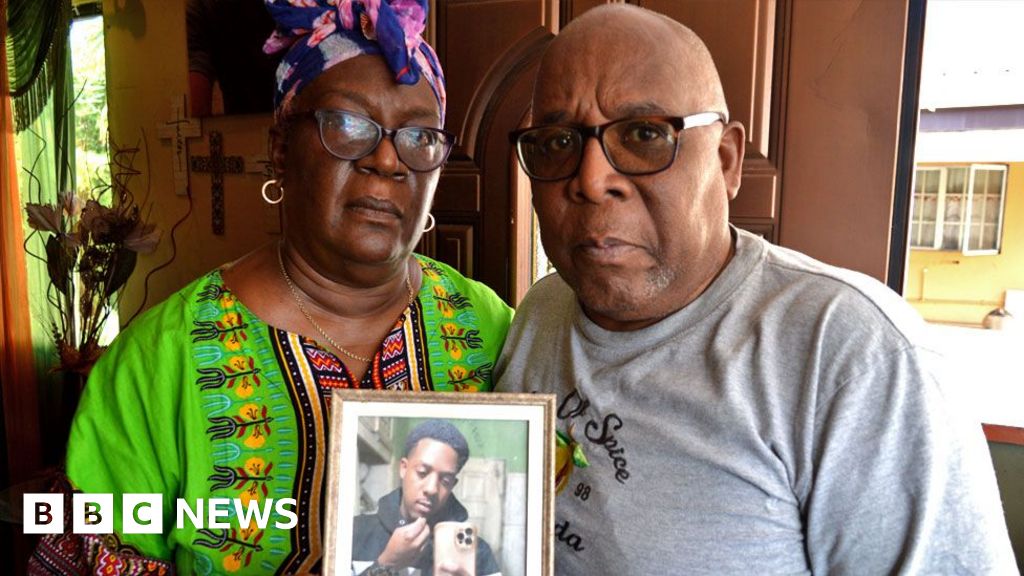Reporter, Port of Spain
 Anselm Gibbs
Anselm GibbsFor Margaret Charles, the new year started just as the old one ended, days filled with grief and no end to a mother’s worst nightmare, after her son’s life was snatched away in a brutal murder.
Sitting on the porch of her home located in Moruga, a rural town in south Trinidad, Margaret ran through a range of emotions as she spoke about her son, Shakeem Charles, who was killed last July.
“I’m being faced with it every day,” Margaret told the BBC.
“There’s a letter that Amarah wrote to her father for Christmas, and when we sat down for lunch, she said: ‘Nobody is to sit on that chair, that chair is for daddy.'”
 Anselm Gibbs
Anselm GibbsShakeem’s two children, Amarah, seven, and Amare, three, now spend a lot more time with their grandparents.
Their 32-year-old father was just one of the many murder victims in Trinidad and Tobago in 2024, which was the Caribbean nation’s deadliest year on record with 624 homicides, according to data from local police.
Shakeem was an Information Technology technician, but his family said that shortly before he was killed, he had started working with a local ride-hailing company to earn extra money.
Margaret said her son went missing on 9 July after taking a job to drop off a passenger in another southern town.
The ride-hailing company said Shakeem’s only trip that day ended at around 17:25 local time.
That night, calls to his mobile phone went unanswered. However, his family got a notification for an ATM cash withdrawal from a joint bank account.
The following day, through GPS tracking, his car was found abandoned more than 80km (50 miles) away in north-east Trinidad.
Margaret recalls how, after four days of searching, Shakeem’s body was discovered in the same southern town where he was hired to drop the passenger. An autopsy determined he died from multiple gunshot wounds.
Police are yet to charge anyone in connection with the killing.
 Anselm Gibbs
Anselm GibbsWith murders soaring, Trinidad and Tobago’s government declared a state of emergency on 30 December. It was originally due to last 15 days, but as it was about to run out, parliament voted to extend it for a further three months until mid-April.
Authorities blamed gang warfare for six murders over the two preceding days, while government officials said concern about reprisal killings prompted the state of emergency.
Five of those six killings happened in one shooting incident on 29 December, in Laventille, an area just outside the capital, Port of Spain.
Some residents say crime has become part of the culture in Laventille.
Joeth Roberts says that what stopped him from joining a gang when the opportunity arose was his upbringing.
 Anselm Gibbs
Anselm Gibbs“I was approached by a person who was looking for underlings, someone to run the block,” Joeth recalls.
“He offered me a firearm and other stuff, but that wasn’t in me,” Joeth says, thanking his parents for the way they brought him up.
Shaquille Gaskin, who also lives in Laventille, told the BBC that he knew a few people “who are very excited to do the wrong things”.
Shaquille is a musician who plays the steelpan. He says he remains firmly on the right side of the law, but that there are others in the neighbourhood who are drawn to crime.
 Anselm Gibbs
Anselm Gibbs“That’s because that’s what they know, they grow up seeing that, seeing the older ones doing that, so they automatically go into that.”
The musician is convinced that there are lots of opportunities for people in so-called “crime hot spots” to be law-abiding citizens, but he thinks the government and others offering those opportunities should engage with at-risk communities more actively.
He argues that in order to get young people on board, a consistent effort has to be made to get them to stay on the right path rather than be tempted by gang leaders’ offers.
It is an opinion echoed by Dr Malisa Neptune-Figaro.
The criminologist at the University of the West Indies says that her research suggests that gangs started becoming more prevalent in Trinidad and Tobago at the beginning of this millennium.
Dr Neptune-Figaro has also found that many offenders were victims themselves at some point.
 Anselm Gibbs
Anselm Gibbs“You have to look at how they feel as persons. If you feel despondent and you don’t feel like you belong in our contemporary society and mainstream society, you’re going to have this parallel society, where you feel like you belong,” she says.
“You have to talk about what the gangs do for them as well, [why] they feel at home.”
The state of emergency gives law enforcement officers extra powers to make arrests and conduct searches without warrants.
Minister of National Security Fitzgerald Hinds said the state of emergency had already led to a reduction in murders, shootings, robberies and car thefts.
Police say they have arrested over 650 people.
However, Dr Malisa Neptune-Figaro warns that this crime-fighting tool may only work in the short term.
The criminologist at the University of the West Indies argues that long term, there should be a focus on refurbishing and revamping the criminal justice system.
But she says that there has to be a wider approach too, incorporating “different elements of society, our education system, finding jobs for persons who are unemployed, giving them alternative measures to crime, better parenting styles”.
For Margaret Charles, the extension of the state of emergency has raised her hope that the police will catch whoever killed her son and bring them to justice.
“Not only Shakeem’s case, but in any case, that people who they suspect and for some reason or the other they couldn’t hold them and question them or probably search, that something happens,” she says.
#Authorities #grapple #crime #culture




